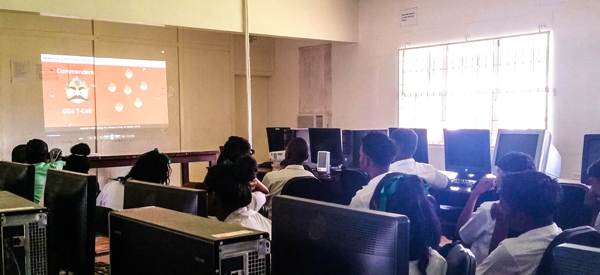Returning home to Guyana in hopes of empowering teenagers about HIV prevention
After her freshman year at Stanford, Riasoya Jodah returned to her home in Guyana with a desire to make a difference. She spent the summer working at Georgetown Public Hospital as a recipient of the Halper International Fellowship from Stanford’s Haas Center for Public Service.
As an assistant in the pediatric surgery department, Ria performed pre- and post-operative tasks and observed surgeries in the operating room. She also worked with Baby Heart, an international team that trains local doctors to perform cardiac surgeries. Ria took initiative to spread HIV education to young people outside her daily work after discovering TeachAids through a friend. She chose to engage with high school students in Mahaica, a rural region north of her hometown in Georgetown, because of her previous experience with the region and her potential to impact attitudes there.
“I had spent weekends growing up on a family farm in Mahaica, and knew that topics like HIV and AIDS were taboo in the culture there, but early marriages and teenage pregnancies were not uncommon,” Ria explained about her reasons for choosing this region. She described the people of Mahaica as “one big family” where neighbors know each other well and care deeply about community well-being. The close-knit nature of the region makes it easy to forge connections, but difficult to discuss taboo subjects like HIV and AIDS.
Ria worked with a group of 20 tenth-grade students at Bygeval Secondary School using a projector to screen the Indian English TeachAids animation for the group. Before showing the video, Ria led the class in a game called Cross the Line (from the TeachAids Educator Handbook) during which students crossed an invisible line in the center of the classroom if they agreed with different statements.
“The questions progressed from very light questions like ‘cross the line if you wear glasses’ to ‘cross the line if you would share a room with someone who is infected with HIV/AIDS’ and finally to ‘cross the line if you are afraid of HIV/AIDS.’ Some misconceptions were identified and everyone in the room got a bit more comfortable with each other and the idea of talking about AIDS,” Ria explained. She noted that the students had several misconceptions about HIV, including that you could get HIV from sleeping in the same room or sharing food with an infected individual.
After the game, the class viewed the animation and engaged in a discussion facilitated by Ria. She noted that the students responded positively to the animation, which features celebrities Amitabh Bachchan and Imran Khan, because many people in Mahaica watch Indian films and are familiar with these actors’ work.
Ria said the experience made her aware of the difficulties surrounding HIV education in Guyana. According to UNAIDS, HIV prevalence in Guyana has decreased due to increased government attention since the early 2000s, but stigma and misinformation still impede access to care. Sustained attention is needed to address these barriers and continue to decrease HIV prevalence, currently at 1.5 percent.
“I was initially worried that the students would be too shy, and the material would be too basic, but I realized that there are still large general misconceptions about HIV/AIDS which can go unaddressed. TeachAids helped to create a comfortable learning environment where students were not only able to learn, but they were able to relate to the idea of HIV/AIDS,” Ria said.
We applaud Ria’s efforts along with others such as Jocelyn Friedman, a Peace Corps Response Volunteer, also educating children in Guyana on HIV prevention efforts. It is such leadership efforts which inspires others to take action and empower one another.
